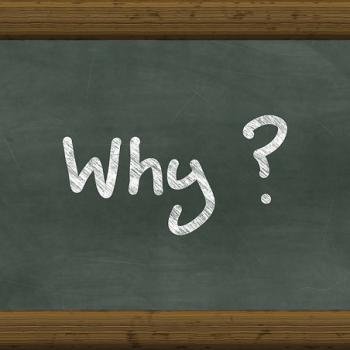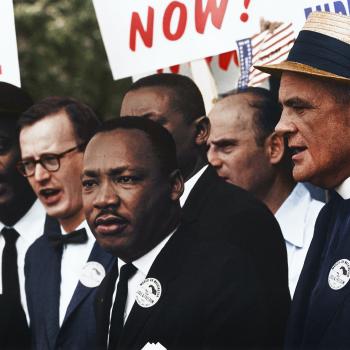
As 2022 comes to a close, many people start thinking about New Year’s resolutions for 2023. What does it look like to do so as a person of faith? How do we connect our religious or spiritual traditions with our hopes and dreams for a new year?
How do we make religious New Year’s resolutions?
Connect to Your Purpose
Religion, at its best, connects us with our deepest sense of purpose in our world. As we consider what New Year’s resolutions we might want to make, we can consider this sense of purpose.
What do you know about your sense of purpose? What big-picture callings, invitations, or God-given desires do you sense in your life? What are you excited for in a new year that relates to those callings? What do you want to try?
Some people find it helpful to choose a word for the year. Personally, I never really intended to do that, but in the last couple years a word has come to me without me really going and looking for it. That feels like something to pay attention to.
These have been words like “try,” “brave,” and “connect.” Broad, expansive words that breathe something new and interesting into the coming year. Words that capture hopes and dreams.
People who share a religious tradition often share some general senses of purpose. Love God and love people, for example. Act justly, love mercy, walk humbly with God.
As we make New Year’s resolutions, we can hold these general senses of purpose alongside our own personal senses of purpose. We don’t have to choose one or the other; we can let these two sides of our sense of purpose play off one another, grow together, inform one another.
Engage What’s Been Life-Giving
At its best, religion is energizing. It offers rituals to ground us. It gives us practices of prayer and worship that help us feel connected to God, ourselves, and others.
Religious communities, at their best, provide a deep sense of belonging.
As we consider what kinds of New Year’s resolutions we might want to make, we can ask ourselves questions like these:
- What practices have felt life-giving in the last year?
- What have I experienced as energizing?
- What have I found hopeful?
- What has brought me joy?
- How might I build more of these life-giving, energizing practices into my life in 2023? Or, how might I keep building these practices into my life?
- What challenges do I face—that is, what keeps me from leaning into these life-giving practices? How might I address these challenges and make time for what’s energizing?
These practices could be specifically religious, like praying or attending worship services. But they don’t have to be. We can think broadly about what gives us life, trusting that God is in these things.
You might find joy in hiking, or in cooking a meal for friends. Personally, I consider swimming a life-giving practice. It’s not church—but it’s good for my mind, body, and spirit. And I think God is honored in that.
Sometimes as religiously-oriented people we need to be reminded that caring for ourselves is good and holy. Our own bodies and souls are worth tending to and taking care of. And when we love ourselves well, we have more capacity to love others too.
Consider What’s Been Missing
As we think about practices that have sustained us and brought us joy in the last year or so, we can also think about this: What is missing?
Is there anything we know brings us life and energy—or we suspect might bring us life and energy—that we haven’t been doing? What would it look like to add this to our life?
We can think small, here. It doesn’t have to be a big step. Brené Brown’s words from Daring Greatly have stuck with me: “A twenty-minute walk that I do is better than the four-mile run that I don’t do.” (Relatable!)
We can think small, doable, sustainable. We can think about realistic ways to add the life-giving practices we’ve been missing—whether that’s taking a walk in the woods, or painting, or making time to catch up with friends, or whatever it might be.
Personally, I read a little bit of First Nations Version: An Indigenous Translation of the New Testament recently, and I got the feeling it was what I didn’t know I needed in my spiritual life. I was struck by the beauty of its language, grounded in Indigenous worldviews and practices.
Maybe a fresh-to-my-ears translation of the New Testament is what was missing for me. I plan to keep reading.
Connect with Community
New Year’s resolutions might sometimes feel like an individual thing, something we do on our own. But in the Bible, going all the way back to Genesis, humans—not just men, but all humans; we can unpack the gender issues in Genesis 1-2 another time—were not meant to live our lives alone.
What if New Year’s resolutions—especially for those of us who are religious—didn’t have to be something we do as isolated individuals? What if they were something we approached together in faith communities?
This year we might consider inviting others to join us and make some shared commitments together. We could do this with a spouse, a couple of friends, a small group, or another community we’re a part of that’s meaningful to us.
These shared commitments could take whatever forms the group wants them to take. Maybe the group wants to have dinner together once a month. Or maybe everyone decides to donate monthly to an organization serving the broader community.
Or maybe the group doesn’t all make the same commitments, but instead everyone shares their personal commitments with one another. That way, people can offer one another support and encouragement throughout the year.
We don’t all have to be doing the same things to share this journey together.
Who might you talk with about your hopes for the new year? Who can you ask about their hopes and support them along the way?
Connect with Earth
At its best and most authentic, religious life connects us not just with God and other people but also with our whole Earth. Plants, animals, soil. The air we breathe and the water we drink.
As you consider your New Year’s resolutions this year, what might it look like to do so with an eye toward Earth? With concern for the climate crisis? With attention toward the ways our world is out of balance, many of us over-consuming and living unsustainable lives—often without thinking twice about it, because that’s what everyone around us seems to be doing?
How do we love Earth and honor all her interconnected systems—and our own dependence on her?
We might consider practices like these:
- Building (or maintaining) a practice of recycling
- Reusing things that can be reused
- Thrift shopping
- Joining a local Buy Nothing group
- Planting a vegetable or herb garden
- Volunteering to clean up a stream
- Giving to a local organization committed to healing the land
- Spending time in the natural world nearby us and getting to know the local ecosystems better
- Reading a book (such as All We Can Save) that can help us better understand the global environmental crisis we’re in
I’m no expert; I’d love to hear what practices you’ve committed to or are going to commit to that might help heal our world.
Our religious traditions can help us connect with the idea that God created this world and loves every bit of it. Part of our calling here is to share in this love, and in healing.
Infuse with Grace
I’m hopeful that by connecting to our deepest sense of purpose, following what’s energizing, starting small, and connecting with like-minded community, we might have an easier (and more enjoyable) time pursuing some of the things we want to pursue in 2023.
But I’m sure it won’t be smooth sailing all the way. And that’s okay. We often make some great New Year’s resolutions but find it difficult to follow through.
One of the downsides of religion is that it can sometimes induce guilt. We might make New Year’s resolutions and then feel bad when we break them; we might feel even worse and even more guilty if these broken resolutions were religious in nature.
But building energizing practices of love and care into our lives can take some trial and error. So, if nothing else, let’s commit to not feeling guilty if we don’t stick with our commitments. Sometimes it takes time to figure out what is actually doable and what is a nice-sounding pipe dream that doesn’t work in our real lives. I think God is in the process.
I think there is grace, so much grace. Our New Year’s resolutions can be infused with this grace. We can acknowledge and not be ashamed of our human limitations, our tendency to bite off more than we can chew. When this happens, we can reevaluate.
We don’t have to set resolutions just once a year and stick to them at all costs. We can keep leaning into our sense of purpose and keep listening for a sense of calling as we go.
The point is not to set goals and achieve them. The point is not to embody perfection. The point is not to avoid screwing up.
The point is to engage proactively in spiritual practices that are life-giving, community-building, and Earth-healing. The point is to live our lives in a way that’s consciously, intentionally connected with one another, God, our own best and deepest selves, and our already-interconnected world.
I hope these thoughts breathe some new life into your resolution-making process this year. Joy and peace to you in 2023.
**Note: This article is a brief break from a series of reflections on religion-related things I’ve changed my mind about over time. We’re currently looking at the Bible and how we read and understand it. For example, what does it mean to take the Bible seriously? And, in what sense is the Bible “inspired”? Feel free to subscribe to the Always Re-forming newsletter or come back anytime if that sounds interesting to you.












